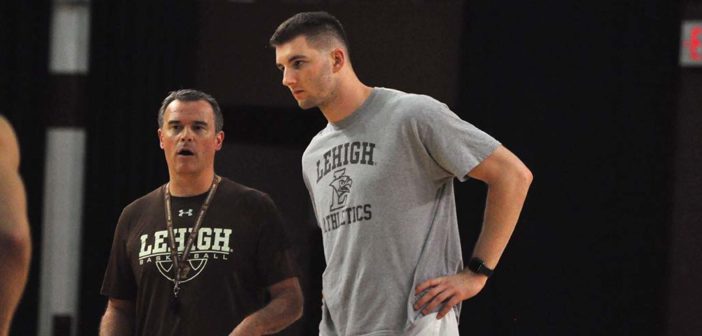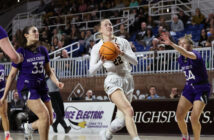After three years of top-notch performances on the lacrosse field, senior attacker Andrew Pettit was ready for an unforgettable end to his Lehigh career.
While preparing for the opening game of the spring 2019 season, Pettit took a random off-step during a drill in practice.
Pop.
In that moment, Pettit knew he didn’t need an X-ray to tell him what he already understood. The sickly sound emanating from his knee was a noise no athlete ever wants to hear, for it means only one thing — a torn ACL.
As Pettit struggled to sort his thoughts from his pain, it was clear this season would be unforgettable. But not in the way he thought.
While the class of 2020 finishes out their own memorable final spring, several senior athletes reflect on the physical and emotional effects of injuries sustained during their Lehigh careers, adding adversity to the already rigorous world of collegiate athletics.
Senior women’s lacrosse attacker Autumn Ryan vividly remembers her injury.
Like Pettit, Ryan suffered a torn ACL and meniscus while competing in a game this past fall. Though Ryan recalls feeling pain, she said any physical damage she felt was overshadowed by panic.
“Within 10 seconds of having a sense of what went on, I kind of knew by the severity of what it felt like, what I was headed for in the future,” Ryan said. “It was really upsetting because I had a feeling that my senior season was over, so I would say that the feeling of not being able to play took over the fear of the injury in that moment.”
Ryan’s torn ACL forced her to miss not only the remainder of the fall, but also the entirety of the spring season. She spent months in physical therapy trying to build back strength in her leg and learning how to adjust to her new reality.
Pettit, who also spent time rehabilitating his knee after the tear, said major injuries force athletes to relearn simple tasks over nearly a year of recovery.
“You really learn the little things again,” Pettit said. “You go from being a big athlete and doing all this stuff, to learning how to walk again. Taking pride in those baby steps and the days where you learn to jog again or put your leg up made the process doable, but it was a long one.”
With the help of his coaches and trainers, Pettit made a full recovery and returned for a fifth year. In his first game back on the field, he scored the team’s first goal only a minute into play, a memory that he describes as a “cool moment” in his career.
Reva Alderman, a senior utility player on the women’s softball team, also had a triumphant return to her sport following an injury.
During the fall 2019 season, complications from osteochondritis dissecans, a joint condition, caused cartilage in Alderman’s left knee to wear down and break off from the bone.
After three months of unsuccessful physical therapy, Alderman underwent surgery to correct the damage to her knee. Ten weeks later, she was cleared to return for the spring season. Although she was nervous about coming off of the injury, Alderman said her return was one she would always remember.
“The feeling of being back on the dirt with my teammates was phenomenal,” Alderman said in an email. “We were playing Georgia Southern in Florida, and I actually hit an RBI in my second at-bat that helped us win 1-0. I don’t think I will ever forget that at-bat.”
While some senior athletes made full recoveries, others are still coping with their injuries.
Jack Lieb, a senior center on the men’s basketball team, broke his right foot in a freak practice accident during his freshman year. To correct the break, Lieb underwent two surgeries.
In the months following the second surgery, Lieb sustained nerve damage throughout the lower half of his right leg, leaving him with pain, numbness and motor function impairment that still persists three years later. Because of overcompensation in his left leg, Lieb has suffered bone spurs, a torn labrum and hip impingement, leaving both legs damaged and causing constant pain.
Lieb said his approach to the situation has been optimistic, and he chooses not to focus on the unfortunate effects.
“I’ve dealt with a lot of physical conditions, but the biggest thing for me was not to turn a negative situation into an even more negative situation,” Lieb said. “I could either dwell on the situation and make things worse for myself, or I could turn a negative into a positive, and that’s the kind of competitive attitude I’ve always had.”
Due to his injuries, Lieb has been unable to play a single game of college basketball. Despite his setbacks, Lieb remained a leader on the team by mentoring other players, supporting his teammates and helping the coaches. His efforts led his teammates and the coaching staff to name him as team captain and to view him as an honorary assistant coach.
Despite the disappointments resulting from their injuries, the athletes agree their experiences have ended on a positive note.
Ryan plans to return to Lehigh next year for a fifth season, while Alderman and Pettit look forward to graduation and, for Pettit, a real estate finance job in New York City.
Interested in making his coaching status official, Lieb is considering a master’s degree and a career as a coach.
Looking back on his time at Lehigh, Lieb said his injury, though unexpected and devastating, ultimately taught him more about himself and how to approach life.
“If you told me four years ago that that’s how my Lehigh career would have gone, I would have put a million dollars down and said there’s no way,” Lieb said. “It just goes to show that some things are out of your control, but the best thing you can do is figure out how you manage that situation and move forward.”






Comment policy
Comments posted to The Brown and White website are reviewed by a moderator before being approved. Incendiary speech or harassing language, including comments targeted at individuals, may be deemed unacceptable and not published. Spam and other soliciting will also be declined.
The Brown and White also reserves the right to not publish entirely anonymous comments.
1 Comment
Good for you Jack and all the rest, those mentioned here and those who coped but were not mentioned.